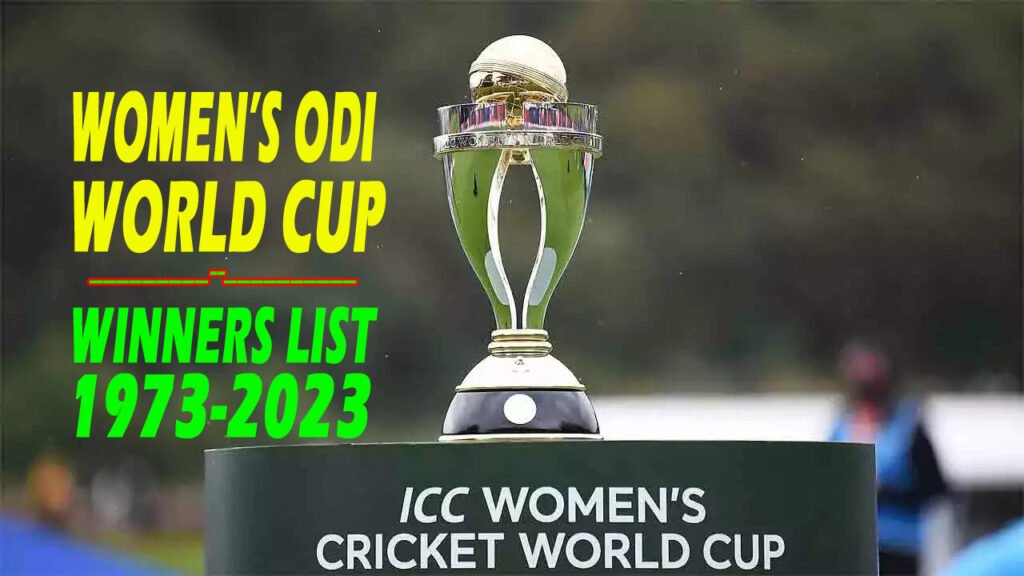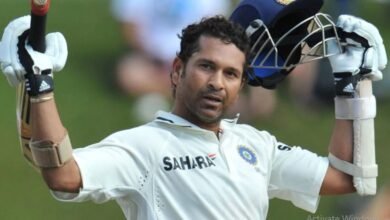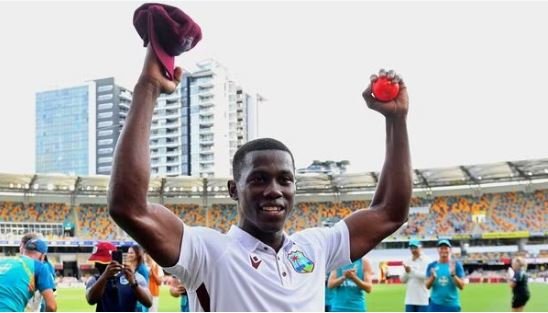ICC Women’s Cricket World Cup Winners List (1973-2023) Full Winners And Runners List
ICC Women’s Cricket World Cup Winners List (1973-2023)
The ICC Women’s Cricket World Cup Winners List from 1973 to 2023 provides a comprehensive overview of past champions and runners-up, along with details about the finals venue and host country.
The international championship for women’s One Day International (ODI) cricket is called the Women’s Cricket World Cup. Since 1973, the International Cricket Council (ICC) has been in charge of organizing the competition, which takes place every four years. Australia is the current champions, having won the 2023 World Cup.

One of the most prominent competitions for women’s sports, the Women’s Cricket World Cup is always fiercely contested by the best teams worldwide. Throughout its lengthy and illustrious history, some of the finest female cricket players ever have triumphed in the competition.
The World Cup Qualifier and the ICC Women’s Championship are the paths to World Cup qualification. The tournament’s roster is incredibly cautious; since1997, no new teams have made their debut, and since2000, the World Cup’s total number of teams has been set at eight. But the ICC announced in March 2021 that the event would increase to ten teams from the 2029 edition. A record eleven teams competed in the 1997 edition, the most in a single tournament to date.
India and England have hosted the World Cup three times each out of the twelve that have been played to date. The other five countries have hosted the tournament. Australia is the most successful team, having only three times finished outside the final and winning seven titles. The only other teams to win the tournament are England (four wins) and New Zealand (one title). India (twice) and the West Indies (once) have both advanced to the final but have not won.
The Women’s World Cup Winners are Listed Below
· Australia (8 times): 1978, 1982, 1997, 2005, 2013, 2017, 2022, 2023
· England (4 times): 1973, 1993, 2009, 2017
· New Zealand (1 time): 2000
Year | Winner | Margin Won By | Runners Up | Host Country | Finals Venue |
2023 | Australia | 19 Runs | South Africa | South Africa | Newlands, Cape Town |
2022 | Australia | 71 Runs | England | New Zealand | Hagley Oval, Christchurch |
2017 | England | 9 Runs | India | England | Lord’s, London |
2013 | Australia | 114 Runs | West Indies | India | Brabourne Stadium, Mumbai |
2009 | England | 4 Wickets | New Zealand | Australia | North Sydney Oval, Sydney |
2005 | Australia | 98 Runs | India | South Africa | SuperSport Park, Centurion |
2000 | New Zealand | 4 Runs | Australia | New Zealand | Bert Sutcliffe Oval in Lincoln |
1997 | Australia | 5 Wickets | New Zealand | India | Eden Gardens, Kolkata |
1993 | England | 67 Runs | New Zealand | England | London |
1988 | Australia | 8 Wickets | England | Australia | Melbourne Cricket Ground |
1982 | Australia | 3 Wickets | England | New Zealand | Lancaster Park, Christchurch |
1978 | Australia | 8 Wickets | England | India | Lal Bahadur Shastri Stadium, Hyderabad |
1973 | England | 92 Runs | Australia | England | Edgbaston |
Evolution Of Women’s Cricket
When a group from England visited Australia and New Zealand in 1934, women’s international cricket was played for the first time. England won the inaugural Test match, which took place on December 28–31, 1934. The first Test of the next year was against New Zealand. When South Africa played many matches against England in 1960, these three countries were the only ones playing Test cricket for women.
In 1962, English first-class teams played their first game of limited overs cricket. Men’s cricket saw its first international one-day match nine years later at Melbourne Cricket Ground between Australia and England.
Under Jack Hayward’s leadership, discussions on hosting a World Cup for women’s cricket started in 1971. Due to international pressure over its apartheid policies, South Africa was not invited to compete. Australia and New Zealand, the other two Test-playing countries, were sent an invitation. The other two participating countries, Trinidad & Tobago and Jamaica, were selected from this region by Hayward, who had previously arranged for English ladies to travel to the West Indies.
In addition, England fielded a “Young England” team and a “International XI” to make up the numbers. In retaliation for the squad not being accepted, five South Africans were extended invites to play for the International XI; however, these invitations were subsequently revoked.
Two years before to the first men’s Cricket World Cup, the initial competition took place in June and July 1973 at several locations throughout England. England’s match against Australia was the final planned match of the round-robin round.
Australia had won four games and had one abandoned going into the match, giving them a one-point lead in the standings. Although they had lost to New Zealand, England had also won four games. Consequently, the game also functioned as the competition’s de facto final. To win the championship, England defeated Australia by 92 runs in the match played in Edgbaston, Birmingham.




